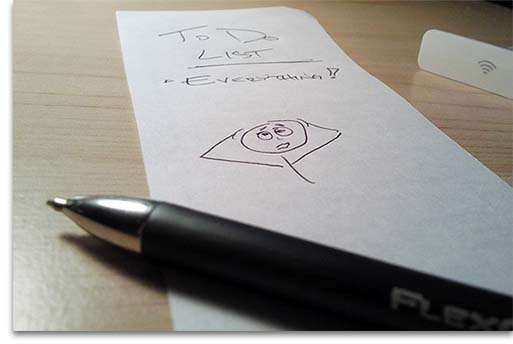My friend and founder of this site, recently wrote about his latest obsession: time management. David has admirable intentions to be as efficient as possible each day but feels he comes up short.
This is an all too common feeling! My inclination is to help so am sharing a few tips and tricks I have up my sleeve. Feel free to use them, add to them and share them with others. But be careful! We don’t want everyone to be too efficient – after all, what would we do with all that extra time?
Bonus! Trish has now added a video for her top FOUR Time-Management Tips for Caregivers here:
Ok…back to the original article of her TEN Tips for Caregivers:
- Make a List. The list is the first step toward good time management and it must be written down. Having a list in your head is completely different than actually writing it down. Sometimes my list is hand-written and sometimes it develops into a 13-sheet, color-coded Excel spreadsheet. I could devote an entire article on how to make a great list to ensure successful completion of project but won’t do that here. Keep these tips in mind when creating the list:
A) Create 2-3 columns for your list. Write “work,” “caregiving,” or “personal” at the top of either each column (or some variation of the three).
B) Write down everything you want to accomplish that day, grouping tasks by subject in these columns.
C) For larger projects, add the necessary “little” steps to get the larger project accomplished.
- Manage Expectations. Review the list and give yourself permission to not finish everything on the list in the unrealistic time frame you just assigned to it in your head.
- Be Self-Aware. Everyone has their most productive times of the day. Some people are night owls (definitely not me) and some people have more energy in the morning. In a perfect world, we tackle our projects during our peak hours. However, there are some projects and circumstances that make a person work in their non-peak hours (such as an unplanned night in the ER with a caree). If there is a choice in the matter, tackle that list during peak productive hours.
- Group Tasks. Grouping tasks takes some planning and experience but it can be a huge time-saver. If laundry is on my list, I start a load of laundry and while the washing machine is cleaning my clothes, I may check and respond to emails for the 30 minutes the washing machine is going. Once that 30 minutes is up, the clothes are put in the dryer, another load goes in the washer and I take 30 minutes to clean the house. When Robert wakes up in the morning and I am waiting for him to finish in the bathroom, I start his laundry and put new sheets on the bed. No time is wasted.
- Assign a Micro-Deadline. Do you have an overwhelming number of emails to check? Give yourself a block of time (say 30 minutes while that laundry is going) and read, delete, respond to as many as possible. When the 30 minutes is over – you are done with that task for now. These micro-deadlines are wonderful motivators to be as efficient as possible!
- Save the Internet for Break Time. Everyone needs a break (especially if you have a 13-sheet, color-coded to-do list to get through!). However, going on the internet may start with checking the news and latest sports scores but invariably ends with hours spent on adorable cat videos and hilarious political memes. Put a (short) time limit on break time too.
- Accept Interruptions. As a working caregiver, there are far too many possibilities for interruptions. It is okay. Accept there will be interruptions that eat up moments or even whole days. Carees get sick, appointments take longer than expected and sometimes bathroom duty involves an entire change of clothes instead of just a quick adult brief change. Becoming angry at the interruptions will not make them go away and will probably just make you feel guilty later.
- Embrace Technology. Caregivers spend a great deal of time at doctor appointments, at the lab or radiology center. Having an electronic device to return calls, emails or texts and to keep others updated on a caree’s condition can be a huge time-saver. Don’t think of a long wait for an appointment as wasted time – use that time to check emails, call medical supply companies or even order online supplies. Even time spent driving to and from appointments can be put to good use by listening to books on tape and sharing that experience with your caree.
- Keep Organized. There is a benefit to having caregiving and office supplies organized. There is no wasted time looking for those thank you cards or the extra briefs. Also, keep your contact list current and in one place so time is not wasted searching for something again and again. Get a print-out of upcoming doctor visits at every appointment and double-check your personal calendar to be sure the appointments are entered correctly and time is not wasted going to an appointment at the wrong time or day.
- Tackle the Little Stuff. In David’s blog, he makes a comment about being able to get the big things done but the little items tend to get pushed aside. Remember those mini-deadlines? If “send thank you card” is on your to-do list, take the five minutes the computer is turning on to write a message and address the envelope. Crossing these little items from the to-do list can give you a much needed sense of accomplishment before facing the big items.
There will be days when the to-do list has more left on it than crossed off but those are the days you brush off and tell yourself, “tomorrow is a new day.” As caregivers, we do our best to give our all and that is plenty good enough – completed to-do list or not.
There is no greater sense of accomplishment than that.
Top photo by J. Shultz




